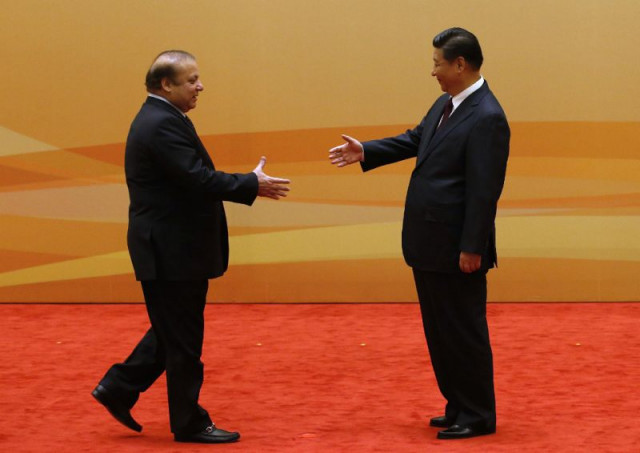Pakistan’s water security made part of CPEC framework
JCC decides to exploit full hydel potential of the country

Prime Minister Nawaz Sharif meets Chinese President Xi Jinping. PHOTO: REUTERS
The decision to exploit full hydel potential of Pakistan was taken during the sixth meeting of the Joint Cooperation Committee (JCC) of the CPEC which was held in Beijing. The JCC is the highest policy making forum of the CPEC.
The JCC also decided, in principle, to make the mass transit projects of all four provinces part of the CPEC. These projects will be formally made part of the CPEC after their financial and technical vetting by Working Group on Transport in February next year.
For development of hydroelectric projects on the Indus River, particularly construction of the Diamer-Bhasha dam, the JCC on Thursday constituted a group, said Planning and Development Minister Ahsan Iqbal after the meeting. The planning ministry released the video of his statement.
China says willing to promote CPEC with Pakistan
“Pakistan may face a very severe water crisis and for economic and food security of the country, the immediate construction of Diamer-Bhasha is crucial,” he said. If the Diamer-Bhasha dam becomes part of the CPEC, it will be a landmark achievement, he added.
For more than two decades, Pakistan has been trying to construct the Diamer-Bhasha dam that has an estimated cost of $14 billion. Due to opposition by India, both the World Bank and the Asian Development Bank have refused to lend money under one pretext or another.

After the rise in tensions along the Line of Control (LoC) in recent months, India’s Prime Minister Narendra Modi had threatened to cut Pakistan’s water supply. He has managed to influence the WB that recently paused the process of playing mediator, which it is bound to play under the 1960 Indus Waters Treaty, according to experts on the accord. Chinese help to secure Pakistan’s water rights will be seen as a major development, according to them.
CPEC: Business forum says private sector must be taken onboard
The Indus River is a source of more than 17 gigawatts of hydropower capacity in India and Pakistan and feeds the Indus Basin Irrigation System, the largest contiguous irrigation network in the world. Pakistan is particularly dependent on the Indus, as more than 90% of its agricultural production comes from this basin.
Ahsan Iqbal said that the sixth JCC has taken the CPEC to the next level, which will ensure Pakistan’s industrialisation and inclusion of all the provinces.
The minister said that the JCC approved to make mass transit projects of four provinces part of the CPEC framework. He said that these projects are Orange Line metro project Lahore, Karachi Circular Railway, Peshawar Greater Circular Railway and Quetta Circular Railway.
Their inclusion in the CPEC will ensure huge tax exemptions and availability of finances for execution. The inclusion of these projects into CPEC is a gift for the people of provincial capitals, said the planning minister.
The planning minister said that the JCC approved to construct one industrial park in each province, Islamabad Capital Territory and in special areas of the country. He said that the Chinese experts would visit Pakistan in February to review their feasibility. The JCC also approved to make three more infrastructure projects part of the CPEC. These are Dera Ismail Kha-Zhob road project, Baseema-Khuzdar road project and a missing link of the Karakoram Highway project.
CPEC: from knowledge to connectivity
The minister said the JCC also decided to start construction work on Matiari-Lahore Transmission Line project. He said the new projects that the provinces had proposed for inclusion into the CPEC have been recommended to the respective working groups for their financial and technical evaluations.
He said it has also been agreed that the Gwadar City Master plan will be completed within one year. The minister said that China also agreed to transfer knowledge in five areas, including water resources management, urban development, small and medium sized industries and climate change.
The Peshawar circular rail project has been accepted as part of the CPEC and the working group will approve it in next meeting, said K-P Chief Minister Pervaiz Khattak after the JCC meeting. Khattak went to Beijing to attend the meeting. He said that K-P’s projects would be approved in February next year. He added that the JCC approved to make one industrial park part of the CPEC while two more will be approved next year.
Published in The Express Tribune, December 30th, 2016.


















COMMENTS
Comments are moderated and generally will be posted if they are on-topic and not abusive.
For more information, please see our Comments FAQ